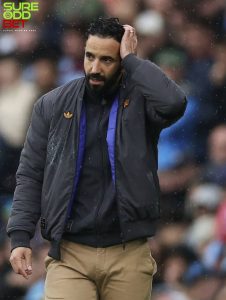
The Facts
After Manchester United’s 3-0 loss to Manchester City in the derby on 14 September, Ruben Amorim has publicly insisted he will not change his tactical philosophy. He reaffirmed commitment to his system and style.
That loss marked United’s worst start to a Premier League season since 1992-93: only 4 points from their first 4 matches.
Despite widespread criticism from pundits and fans over results and performance, Amorim has said that to change the system, you must change the man meaning himself, not the style of play. He appears to be signalling that any changes will come only on his terms.
United currently sit 14th in the Premier League table following this loss. The defensive frailties and inability to convert chances are being heavily scrutinised.
What Amorim Is Saying
He acknowledged the criticism but emphasised that losing games doesn’t necessarily reflect a lack of effort or direction. He believes the team is “doing better” even if the results aren’t yet showing.
Amorim made clear he won’t distort his approach or formation under pressure, insisting that he believes in his philosophy and that the club hierarchy supports that approach for now.
He also cited non-public (behind-closed-doors) issues and pressures affecting performances, suggesting that not everything that fans see or know explains the results.
Concerns & Pressure Points
Many observers (including pundits like Gary Lineker) have criticized his consistent omission of young players like Kobbie Mainoo, arguing they might help turn things around.
The club’s record under Amorim remains underwhelming: only 8 Premier League wins in 31 matches since his appointment.
Defensive errors, lack of attacking cohesion, and tactical rigidity are recurring criticisms. United’s goal conversions are poor, and opponents are often allowed too much space, especially when United are expected to press or dominate play.
Where Things Might Go Next
Immediate fixture scrutiny: upcoming matches like against Chelsea and other big Premier League clashes will become litmus tests. A win might ease criticism; another poor performance could increase pressure substantially.
Possible changes in personnel rather than philosophy: Amorim has signalled he will stick to his system, so any change likely will come in which players are selected, not how they’re asked to play.
Media and fan patience is waning: defeats like the 3-0 derby have heightened frustration, especially when performances don’t look like they’re improving rapidly.
Conclusion
Ruben Amorim’s position is fragile but not yet in jeopardy, apparently. He has public support from the hierarchy, is standing by his methods, and is openly signalling that he will only change things on his terms. But with United’s poor start, low points tally, and high expectations at Old Trafford, the margin for error is slim. If results don’t improve soon, critical voices will grow louder.

